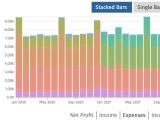Finance
2023
Fee comparison of incoming wire transfers at Japan banks
In this post, I want to compare the total fee at three Japanese banks. The scenario is that all of the incoming wire transfer in US dollars (USD) is converted to Japanese yen (JPY).
2022
Changing GnuCash font size
GnuCash is a software that can track portfolio transactions and performance. There is a binary release for Apple macOS. On a retina display, the application has a very small font and is very hard to read. Fortunately, it is easy to change the font size via a CSS file 1.
Emergency fund with better returns yet safe
It is a common rule-of-thumb to keep 6 months of expenses in cash as emergency fund. Sometimes the recommedation is 3 or even 12 months. Is there a better way than parking that cash in the bank?
Contribution priority for retirement accounts
It’s a common sense to pay off the debt with the highest interest first. This also applies to retirement investment accounts.
Risk capacity
In a previous post, we talked about asset allocation for retirement. To design an asset allocation for a financial goal for an investor, we need to understand time horizon of the goal and risk capacity for the investor. We discussed time horizon previously. Using time horizon, we can arrive at asset allocations for different goals. In this post, we will talk about risk capacity for the investor.
Time horizon
In a previous post, we talked about asset allocation for retirement. To design an asset allocation for a financial goal for an investor, we need to understand time horizon of the goal and risk capacity for the investor. In this post we will talk about the concept of time horizon. Using time horizon, we can arrive at asset allocations for different goals. In another post, we will talk about risk capacity for the investor.
Retirement portfolios
In this post, we showed that the S&P 5001 stock market index is a candidate investment that results in a bigger nest egg than our twin’s. In this post, we discuss mutual fund products, including an S&P 500 one, that we can invest in. A portfolio can own one or more mutual funds. We will make a comparison between a few portfolios that are candidates for retirement investing.
每年 6%,持續 35 年
在《 雙胞胎與投資》的討論中,我們提到,在假設的 6% 左右的年利率下,提早開始投資並投入較少的本金金額,到了退休年齡,可以與較晚開始但投入更多本金金額的雙胞胎打成平手。這種情境假設了一段長達 35 年的投資生涯。但這樣的投資是否真的存在?


